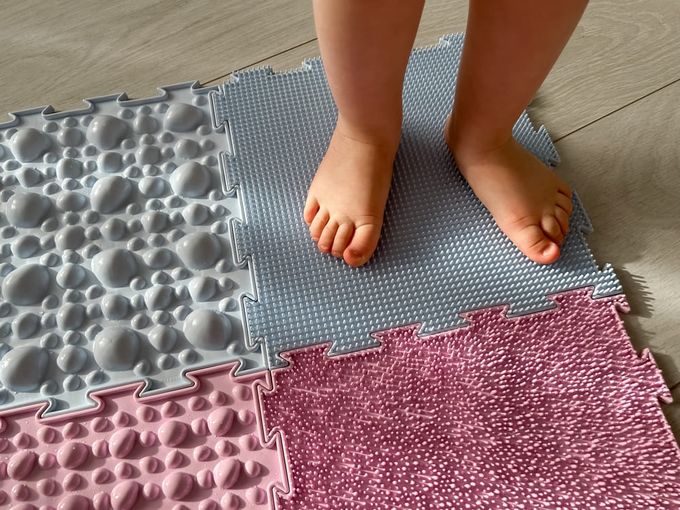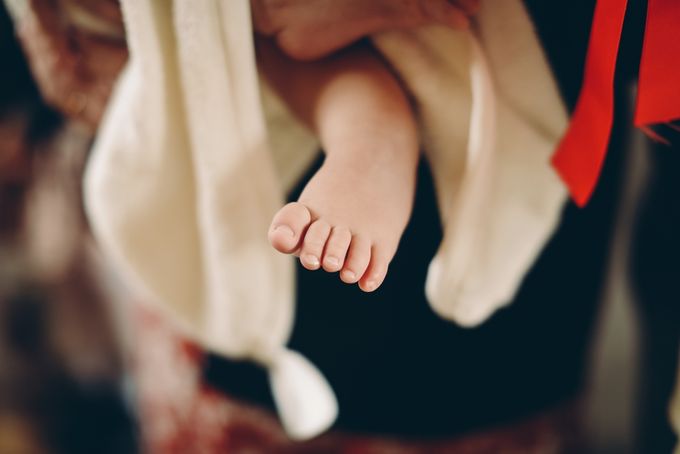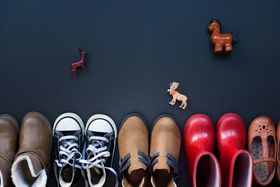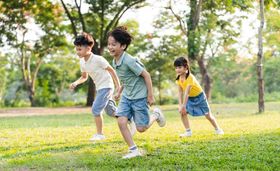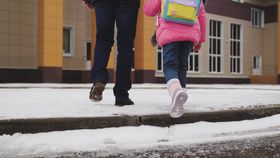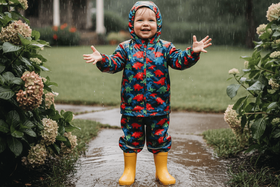Toddler & Baby Sweaty Feet: Is It Hyperhidrosis?
While often normal, learn the signs concerning baby sweaty feet and try tips to keep little feet cool and dry
Updated September 12, 2025
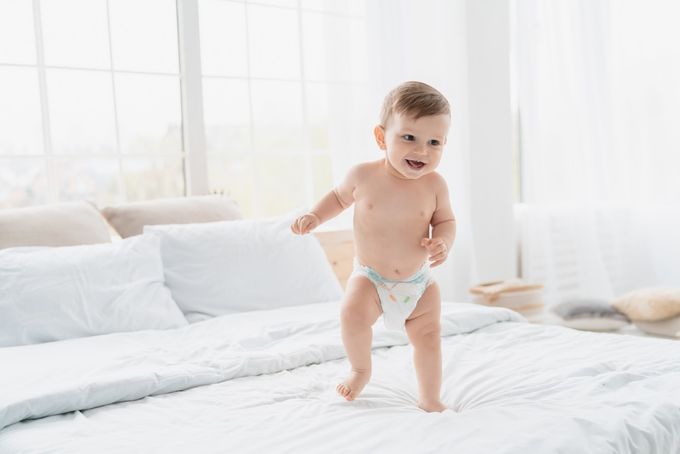
As a parent, you're constantly checking on your little one, and that includes their feet! It's common to find your toddler’s socks and shoes damp after a day of play, leaving you to wonder: Is this normal, and what does it mean if your baby has sweaty feet?
While sweaty feet are often nothing to worry about in young children, they can sometimes be a sign of a condition called hyperhidrosis. This guide will help you understand the difference and give you tips to keep their feet healthy and comfortable.
What's Normal for a Baby's Sweaty Feet?
While foot health is crucial for childhood development, sweaty feet in babies are often a normal part of their growth. For example, many parents notice their baby's feet are sweaty even during naps or cooler weather, which is usually harmless.
Young children have immature sweat glands and a higher metabolism, which means their bodies heat up and sweat more quickly than adults. This is a natural and healthy way for their bodies to regulate temperature.
Crawling, exploring, and playing are hard work, and sweating helps their bodies stay cool during these energy-intensive activities. It's especially common in warm weather or when they're wearing warm clothes and socks.
Did you know that hands and feet have a much higher density of sweat glands than other body areas? This makes them naturally more prone to sweating.
Symptoms of Hyperhidrosis in Kids
Hyperhidrosis refers to excessive sweating beyond the body's regular need for temperature regulation. According to the American Academy of Dermatology, your little one may get symptoms such as [1]:
- Excessively Sweaty Feet: More than occasional post-play moisture, consider if their feet remain damp even in cool environments or during minimal activity.
- Skin Changes: Skin turns soft, white, and peels in certain areas
Interference with everyday activities: Does sweating cause difficulty in your toddler's day-to-day activities?
Causes of Hyperhidrosis in Kids
- Nerve Signalling Issues: In some cases, nerve signals controlling sweat glands become overactive, triggering excessive sweating.
- Underlying Medical Conditions: In rare instances, hyperhidrosis can be the result of thyroid or neurological issues or the use of certain medications [2].
Note: Consult a medical professional if you're concerned about excessive sweating impacting your child's life. They can assess the situation and recommend appropriate treatment options.
Hyperhidrosis in Kids: What You Can Do About It
Early intervention and addressing the underlying causes are crucial for effective management. Here are some ways to help treat the symptoms:
- Maintain good hygiene. Start with a daily foot-washing ritual using lukewarm water and gentle, fragrance-free soap. Remember the spaces between the toes, where moisture can build and cause irritation.
- Dress your child in breathable clothing and use AC to avoid overheating them in warm environments.
- Limit sugary drinks and spicy foods, which contribute to increasing overall body temperature and sweating. Offer water as the primary way to stay hydrated without triggering excessive sweating.
- Let your baby play barefoot indoors on a clean surface so their sweaty feet can breathe freely and air out naturally.
- Relaxation techniques like deep breathing can improve blood flow, thus regulating temperature more efficiently and reducing the need for sweating to cool down.
- Opt for shoes and socks made from natural fibres like cotton or wool to promote air circulation and absorb moisture while avoiding synthetic materials that trap sweat.
- Ensure your little one's shoes fit well, as tightness can contribute to sweating and discomfort by restricting blood flow. Also, wash your toddler's sneakers regularly and leave enough time for each pair to dry completely before reuse.
Talk to a paediatrician or dermatologist if these steps don't provide sufficient relief.
They can assess the severity of your child's hyperhidrosis and recommend more specialised solutions, which could include topical antiperspirants, iontophoresis, or botulinum toxin injections.
When To Seek Help for Baby Sweaty Feet
Consult your paediatrician if your child experiences:
- A sudden increase in sweating that wasn't previously present.
- Additional symptoms like fever, unexplained weight loss, or skin changes.
- Sweating disrupts daily life, e.g., difficulty wearing shoes and sleep disturbances.
- Excessive sweating, even during rest or in cool environments.
- Family history of hyperhidrosis.
How First Walkers Can Help Keep Tiny Toes Cool and Dry
At First Walkers Australia, we understand the importance of keeping tiny feet dry and comfortable. That's why our podiatrist-designed shoes are crafted with features that promote healthy foot hygiene.
We use breathable, natural materials like premium leather and have wide toe boxes to ensure proper air circulation and prevent overheating. Our shoes are designed to give your child's feet the support they need while allowing them to breathe freely.
Keeping Tiny Toes Cool and Dry
Remember, sweaty feet in babies are often nothing to worry about. Their developing bodies are learning to regulate temperature, and active play naturally produces moisture. But excessive sweating can indicate an underlying condition like hyperhidrosis.
By understanding the difference and knowing when to seek professional help, you can ensure your little explorer keeps cool, comfortable, and confident on their adventures.
To help your baby's sweaty feet, First Walker's toddlers' shoe collection offers breathable, comfortable shoes specially designed for playful, growing feet. Browse our wide range of carefully designed shoes to find the perfect fit for your little ones.
References:
- “Hyperhidrosis: Signs and symptoms.” Available: https://www.aad.org/public/diseases/a-z/hyperhidrosis-symptoms
- J. Brackenrich and C. F. Medeus, “Hyperhidrosis,” StatPearls - NCBI Bookshelf, Oct. 03, 2022. Available: https://www.ncbi.nlm.nih.gov/books/NBK459227/
Disclaimer: First Walkers' information is intended for educational and informational purposes related to toddler footwear and feet. We encourage you to consider individual circumstances and consult qualified orthopaedists about specific conditions.
FAQs
Can a dehydrated baby sweat?
Yes, a dehydrated baby can sweat. While it might seem counterintuitive, sweating is actually a way the body tries to cool down. Even when a baby is dehydrated, their body may still attempt to regulate temperature through sweating. However, this can exacerbate dehydration as the body loses more fluids.
Is it normal for a baby to sweat even when it's cold?
Yes, it's normal for a baby to sweat even when it's cold. Babies have a different way of regulating their body temperature than adults. They often have a higher metabolism, which can lead to increased heat production. Additionally, their bodies are still developing, so their thermoregulation system might not be as efficient as an adult's.
Is hyperhidrosis bad?
Yes, hyperhidrosis can be detrimental to a person's quality of life. Excessive sweating can lead to social embarrassment, physical discomfort, skin problems, and occupational difficulties. The constant wetness and moisture can be irritating to the skin, and it can also lead to skin irritation, rashes, and fungal infections.
When do babies regulate their own temperature
Babies typically begin to regulate their own temperature more effectively around 3-4 months of age. This is when their thermoregulation system starts to mature. However, it's important to note that even older babies can still struggle with regulating their temperature in extreme conditions or when they are sick.
How do i know if my baby has a temperature?
Signs your baby may have a fever include warm skin, irritability or fussiness, lethargy, poor feeding, vomiting or diarrhea, and fast breathing. If you suspect your baby has a fever, it's important to check their temperature with a rectal thermometer. If your baby has a fever, it's important to consult with your pediatrician. They can help determine the underlying cause of the fever and provide appropriate treatment.
